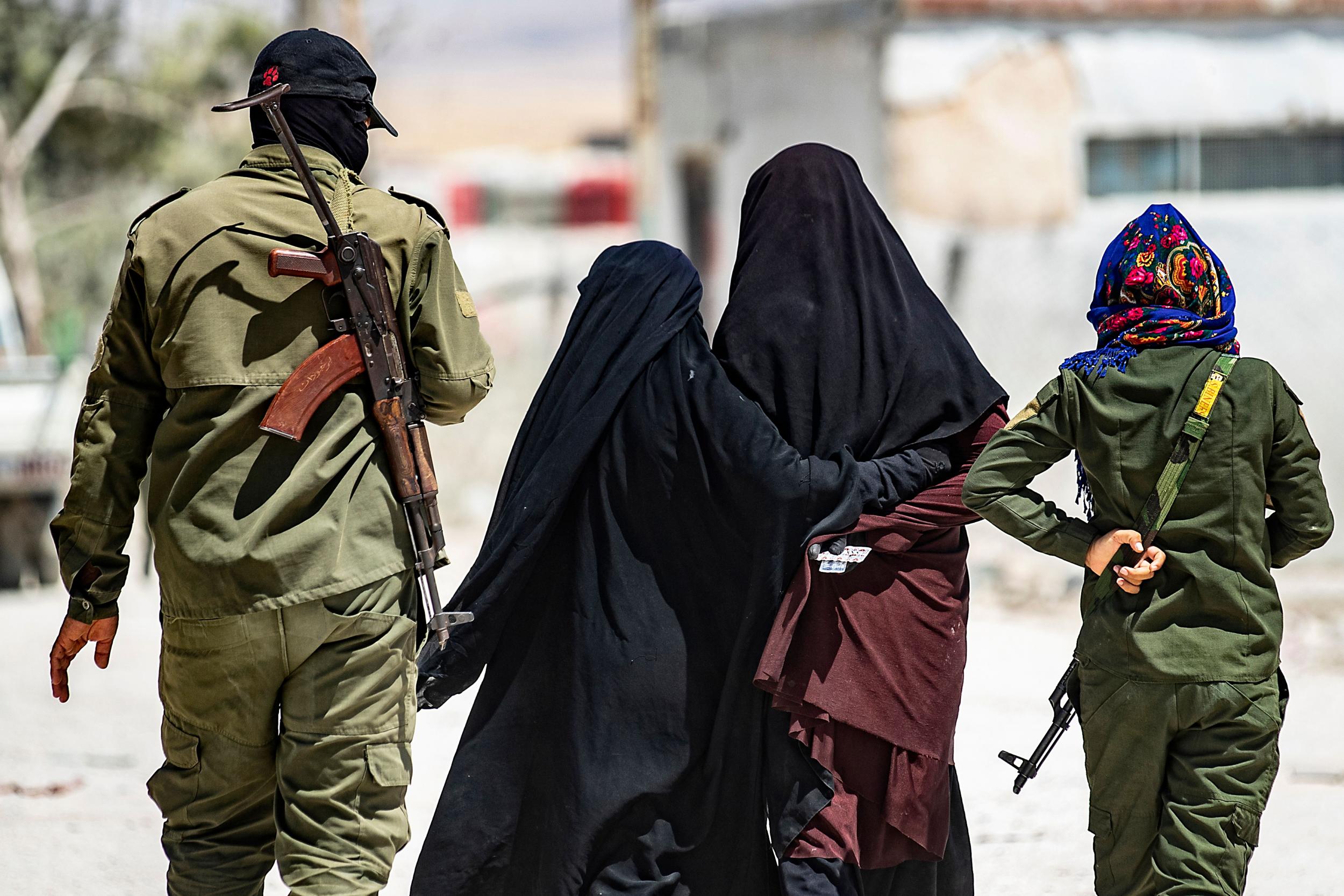Kurdish forces in north Syria warn they cannot secure Isis prisons for much longer
Camp officials have described being threatened and attacked by Isis members in camps which are under-guarded

Kurdish commanders in northern Syria have warned they cannot secure Islamic State prisons and camps for much longer, as sporadic fighting with Turkish forces continues despite a Russia-broken ceasefire.
US officials have said that at least 100 Isis fighters have already escaped since Turkey launched its controversial incursion against Kurdish fighters two weeks ago.
Kurdish officials estimate that an additional 800 Isis family members may have also fled from Ain Issa camp, which was home to some 112,00 displaced people until the entire camp fled amid the fighting.
Among them were nine French suspected Isis members and at least two British citizens: Tooba Gondal, from east London who joined Isis in Syria and worked to recruit others to follow her, and Zara Iqbal, also from east London.
Before the conflict erupted, Kurdish-led Syrian Democratic Forces were holding some 12,000 Isis fighters in detention centres and camps, as well as tens of thousands of their family members.
Their commanders told The Independent that despite a Russia-brokered ceasefire agreement with Turkey, they are still unable to properly guard prisons and camps because they remain under attack.
Turkey has repeatedly denied that it has violated the ceasefire terms and instead accused Kurdish forces of targeting their soldiers. The Syrian Observatory for Human Rights said that clashes continued in many areas close to the border.
“We are still maintaining control but if the Turkish threat and attacks continue, we do not know for how long we will be able to keep these prisons secured,” Mervan Qamishli, an SDF commander and spokesman told The Independent. “We need help stopping the conflict so that our forces can return to protecting and managing the prisons.”
He welcomed the ceasefire which was announced on Tuesday by President Recep Tayyip Erdogan and Vladimir Putin, and built a 30km wide buffer zone in northern Syria. But he maintained the Turkish-backed “had not committed to the truce”.
“We are worried about the Isis prisons and camps and even sleeper cells as they have started to move quickly after the Turkish offensive,” he added.
Turkey’s two-week incursion into northern Syria against the Kurds has sparked concerns that it could lead to the resurgence of Isis who have exploited the security breakdown to overrun camps and break out of jails.
Ankara regards the SDF as a terrorist organisation because of its ties to outlawed Turkish insurgent group the PKK and wants to build a buffer zone on its borders.
The Kurds had been Washington’s key ally in the battle to defeat the jihadi group but have had to deploy forces to the frontlines.
The US is concerned US Defense Secretary Mark Esper appeared to partially reverse a promise by Donald Trump to withdraw American soldiers from Syria and bring them home.
On Friday the Pentagon chief said that more forces and tanks would be deployed to protect oil fields from Isis in northern Syria instead.
“If Isis has access to the resources, and therefore the means to procure arms or to buy fighters or whatever else they do, then it means it makes it more difficult to defeat Isis,” he said.
Concerns have been raised about the biggest camp, al-Hol, which is located close to the Syrian border with Iraq and is home to 70,000 people including 11,000 foreigners affiliated with Isis.
There have already been at least five different attempts by women and their children to break out of the camp since the fighting began.
A leading camp administrator told The Independent that staffers had received assassination threats from women suspected of being Isis members and at one point they felt it was too unsafe to go to work.
Dr Faris, a Kurdish medic running a clinic there, confirmed that the situation was calm on Friday but said that he had been attacked in March of this year before the fighting began.

Dr Sherwan Berry, a Kurdish Red Crescent spokesperson, said: “ There are concerns, a lot of international NGOs had to leave and so there are a lot of gaps in supply lines to the camps. Security is also not good because the guards had to be redeployed to the frontline or elsewhere. We hope it will be solved soon.”
Similar fears were raised about Roj camp, which is closer to the border with Turkey and is home to 950 foreigners including Shamima Begum, who was part of the “Bethnal Green trio” of girls who joined Isis.
Meanwhile, residents of Qamishli border town said they were worried about the Isis prisons in the town after Kurdish fighters were forced to evacuate as part of the ceasefire deal.
Former British citizen Jack Letts or “Jihadi Jack” is reportedly being held in Qamishli.
“Right now, they are guarding the Isis prisons as they have always done, but we don’t know what will happen in the future. We are all very worried,” Sara, a resident, said.
Join our commenting forum
Join thought-provoking conversations, follow other Independent readers and see their replies
Comments
Bookmark popover
Removed from bookmarks